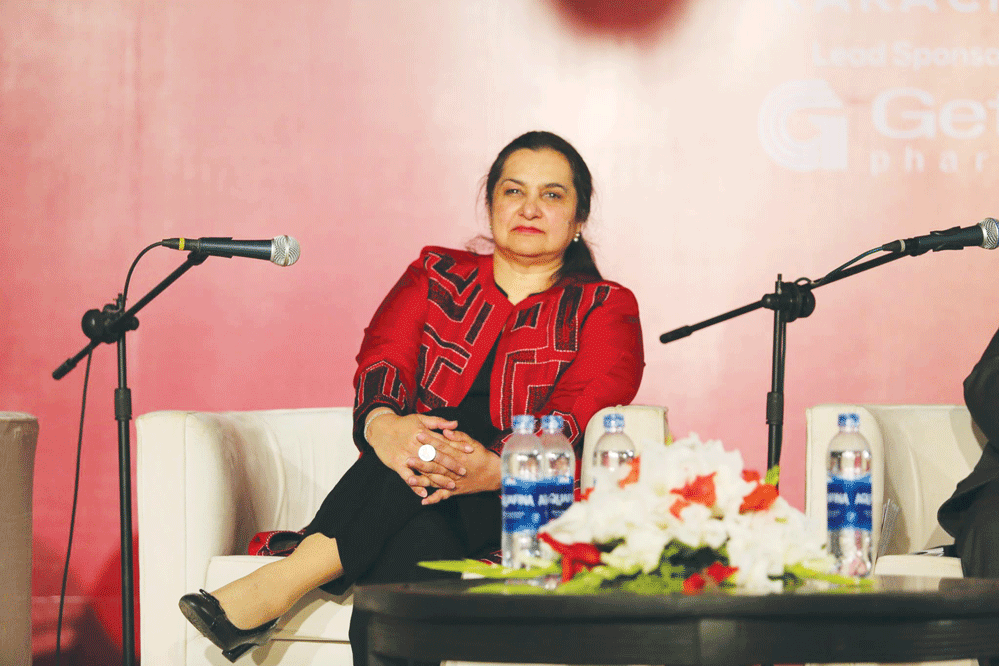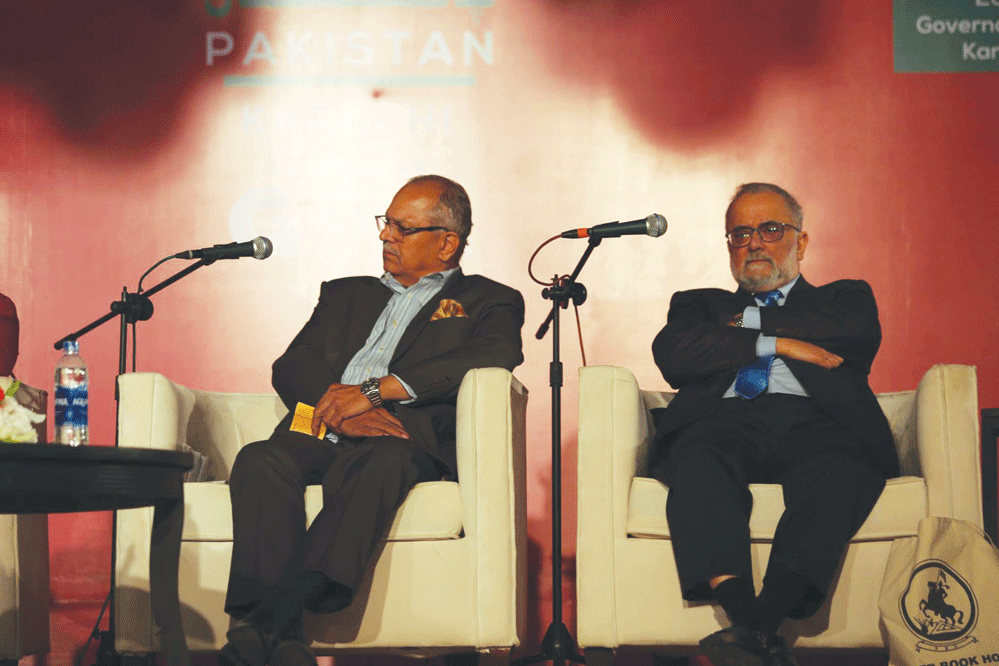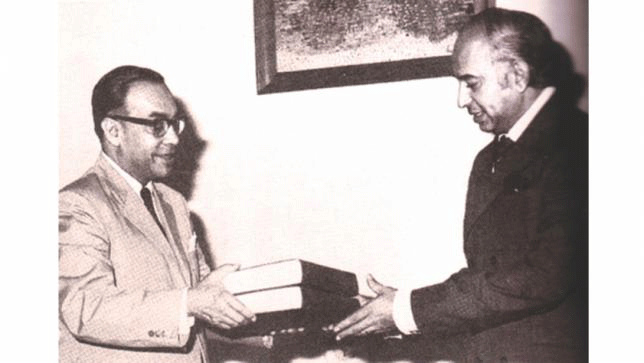The Missing Narrative
By Zubeida Mustafa | Viewpoint | Published 6 years ago

Nasim Zehra
When twice within a span of 10 days you are reminded of the ‘freedom of expression’ Pakistanis supposedly enjoy, it makes you wonder. First, it was a retired ambassador, Karamatullah Khan Ghori, who reminded the audience at his lecture on the Middle East at the Pakistan Institute of International Affairs (PIIA), that in Pakistan the press is more free than in the Arab world. He was right, but it irked me. If we need a yardstick, does it have to be a region which is the worst model of democratic freedoms?
Then came the Adab Festival’s debut in Karachi last month. In the session on Nasim Zehra’s outstanding book, From Kargil to the Coup: Events that Shook Pakistan, we were told by a retired general – Wasim Ghazi – that civil society had failed to present alternative narratives to the conventional stand adopted by the army on various issues. That was very surprising.

General (R) Waseem Ghazib (L) at the Adab Fest in Karachi.
General Ghazi may be right in saying that alternative narratives have not been developed as they should have been, but the key question is: Is there enough freedom of expression in Pakistan to allow members of civil society to openly dicuss Kargil, Kashmir, Balochistan, or even the fall of Dhaka?
One of the panelists at the session pointed out that think tanks in Pakistan are headed or funded by the powers-that-be; consequently they are careful about what they say or the stand they take on a sensitive issue. If one cannot discuss, critique, offer suggestions, raise questions and demand answers freely, where will the alternative narrative come from? How can an alternative narrative be developed without a debate?
To be fair to General Ghazi, he confirmed what Ambassador Shahid Amin said earlier – that the Pakistan Army never learns from its mistakes and continues repeating them, again and again. He also disclosed that while in service, he began to research the army’s move on Kargil, to see where it went wrong. But even before he had reached a conclusion, he got orders from the army chief to stop his work. His research was intended to be for the army’s own benefit, but even that was not tolerable.
That is the mindset. I have experienced it personally at a seminar organised by the Institute of Strategic Studies in Islamabad, 15 years ago. When I asked the speaker on that occasion, who happened to be the foreign affairs adviser, if he could explain the Kargil episode in light of what he had said about Pakistan’s friendly overtures vis-à-vis India, I noticed the uncomfortable silence that followed. But that was nothing compared to the dressing down I received from the host, a retired army general, who I later discovered was a buddy of General (R) Pervez Musharraf. He even had the temerity to tell me that unlike other seasoned journalists I didn’t even know what questions should not be asked. He accused me of not behaving in a dignified manner, given my age and experience. He held up another female journalist as an example. That particular journalist, who had actually been taken to the Kargil front, had the wisdom not to breathe a word about the Pakistani soldiers who had died in Kargil.
Incidentally, my “undignified” question was asked in 2003, which was only four years after Kargil. Yet the wounds of Kargil must have still been raw. I should have known better! After all, the Hamood-ur-Rehman Commission Report on East Pakistan (written in 1974), has remained a mystery to this day – a few sensitive chapters of that report have yet to be declassified. Large parts of it were leaked to the Indian weekly, India Today, in August 2000. Dawn also published it when the Musharraf regime allowed the report to be put on public display in Islamabad.
For long, western democracies followed a rule whereby secret documents were not allowed to be released to the public before the passage of three decades. As the trend is now increasingly towards recognising the citizen’s right to information, the 30-year rule has been whittled down to 20 years and fewer and fewer documents are being kept permanently classified. The Pakistan Army is still hesitant to disclose its role in the events surrounding the birth of Bangladesh, which took place more than 47 years ago.

Justice Hamood-ur-Rehman presenting his report to then prime minister, Z.A. Bhutto in 1972.
Given this mindset, can one really expect civil society to develop an alternative narrative on issues? Activists like Sabeen Mahmud have been shot dead for allowing free space for alternative narratives such as on Balochistan, for instance. Bloggers have ‘disappeared’ for expressing their views on social media.
In this unhappy state of affairs, the role of the civil government has been an ambivalent one, to say the least. General Ghazi had a sorry tale to tell when he spoke of his futile attempts to organise briefing sessions for parliamentarians and other members of the civil government. According to him, they were just not interested and absenteeism was the hallmark of this exercise. Hardly surprising. When the Sindh education minister and 20 MPAs failed to show up despite being invited to a seminar on Article 25-A and the right to education organised by the Idara-e-Taleem-o-Agahi in Karachi, I was disabused of the notion that our parliamentarians want to learn.
Politicians meanwhile, proffer their own reasons for steering away from developing alternate discourses. They maintain that the army dominates the show and does not allow political governments any space in decision-making in foreign or strategic policy. It is no secret that generals have controlled the country for a major part of its history – staging coups, dismissing governments, meddling in politics, or installing their own favourites in office. As a result, political governments are always on their guard.
That leaves the media with the task of developing an alternative narrative. Can it do so? Given its present vulnerability, it is difficult to visualise this happening. Without freedom of expression, can anyone voice their opinion on an issue that challenges the establishment’s point of view and not be accused of undermining state security?
Zubeida Mustafa is a senior journalist. She writes on a variety of subjects but her interest has mainly been in the social sector which she has covered extensively. She has investigated in-depth issues such as education, health care, women’s empowerment, children’s rights and the lives of ordinary people.


